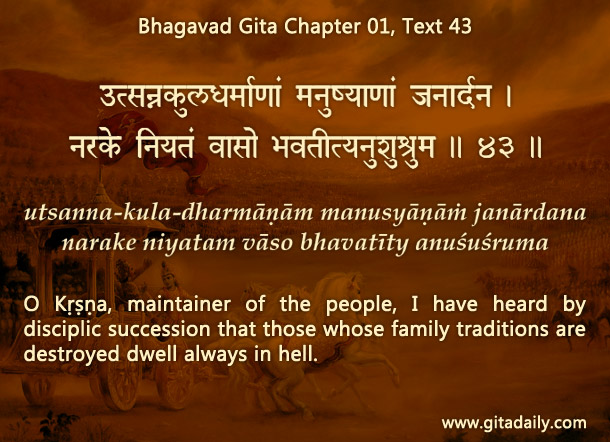In the Bhagavad-gita (01.43), Arjuna states that destroyers of dynasties will be condemned to live in hell forever.
Is the Gita stating the idea of eternal damnation present in some religions?
No; this statement reveals a nuanced meaning appreciated only when seen in the broader context of the Gita’s worldview. The Gita (08.15) mentions that the whole material world is temporary. As hell is also a part of the world, it too is temporary. If hell itself doesn’t exist forever, how can anyone be condemned to hell forever? Further, the next verse (08.16) asserts that no place in this world offers everlasting residence – from all places, one has to come back, meaning that people come back from hell too.
What, then, does ‘hell forever’ mean? It conveys the gravity of destroying dynasties and wrecking the world’s social and spiritual order. This misdeed is so terrible that its reaction – being condemned to hell – will seem unendingly long for the sufferer. The ‘hell forever’ usage is thus non-literal, like the scriptural usage of atma-ha (killer of the soul) to refer to gross materialists. Though their soul is indestructible, this usage underscores that they destroy their spiritual potential by their unfettered materialism.
The non-literality of the ‘hell forever’ statement stems, most importantly, from the Gita’s revelation of God’s nature. Krishna is not a wrathful judge who casts the faithless to the fires of hell forever – he is a merciful guide who in his Supersoul manifestation accompanies all living beings, even the faithless, forever. Far from casting people to hell, he accompanies them even when they, due to their misdeeds, go to hell. And he helps them there and everywhere else to make right choices by which they can attain his eternal abode and become happy forever. So what is forever is not hell, but Krishna’s love.

Explanation of article:


No words to thank you Prabhu. You have made me understand that Krishna loves us eternally irrespective of our shortages.